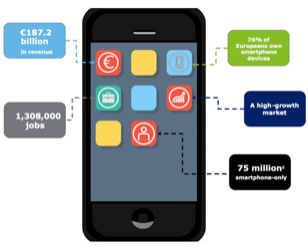In 2019, the app economy contributed a total of €187 billion in direct and indirect revenue to the European Union’s (EU) economy and supported up to 1.7 million jobs in all sectors. In 2019, the app economy added 0.4 percent in value to the EU’s GDP in 2019. Mobile app stores have a tremendously positive impact on the EU’s digital economy by creating a frictionless environment where users and app developers can interact simply and easily.
These are some of the findings from the study, “The App Economy in the European Union: A review of the mobile app market and its contribution to the European economy” commissioned by ACT | The App Association and prepared by Deloitte Finance.
As new technologies increase the spread of connected devices, it is expected that the value of the app economy will only continue to grow. With the EU developing new strategies to support SMEs and designing new rules for digital ecosystems, this study provides accurate data on the current state of the European app market and analyses its contribution to the European economy.
“Apps have fundamentally reshaped the way Europeans interact in almost all areas of personal and professional life,” said App Association Chairperson and Founder Mike Sax. “App makers are in a unique position to provide innovative solutions that positively impact society. For example, during the COVID-19 pandemic, apps have played a crucial role in education, work, and health. The app economy has become essential in supporting economic and job growth across the European Union.”
The research demonstrates the positive impact of app stores on consumer welfare and developer success. App stores have enabled disintermediation between buyers and developers which is one way app stores reduce transaction costs for app developers and their users. They reduce entry barriers for developers, lower development costs (e.g., access to programming tools) while increasing the level of competition, increase consumer trust, and boost security by creating a trustworthy platform for users and developers. Their strong network effects ensure that the benefits derived by both developers and users contribute to the overall health of the app ecosystem. Simultaneously, the volume and diversity of apps available on the stores pushes developers to continuously innovate to attract new users.
The app economy in the EU is thriving. The study shows that in 2019 the app market generated €187 billion in direct and indirect revenues throughout all sectors. In comparison, box office revenues in the EU stood only at €6.8 billion in the same year. The direct revenues of the app economy in the EU amounted to €86 billion in 2019 – these are revenues received by mobile app developers. Direct advertising revenue accounted for €23.3 billion, paid downloads, subscriptions, and in-app purchases amounted to € 5.7 billion – with mobile games representing 67 percent of this revenue – contract work added up to €55.6 billion and €1.6 billion can be attributed to mobile commerce (m-Commerce). Indirect contributions due to additional business and household consumption triggered by app development accounted for another €101 billion. Consequently, the number of jobs supported in 2019 by the European app economy is at least 1.3 million and possibly up to 1.7 million, when combining direct jobs (software developers, mobile app specialists), indirect jobs (suppliers to the app developers) and induced jobs (jobs created by the spending of the direct and indirect jobs).

Future innovations in apps will not only come from hardware developments but mostly from the software side. Apps are likely to offer new types of services as they adopt technologies such as virtual reality (VR), the connection of smart objects, and analysis of user data (collected through apps), and data from external sources by artificial intelligence algorithms. In particular, apps will permeate more and more aspects of our lives, in areas such as the internet of things (IoT), mobility, hybrid events combining both a live in-person and a virtual component, education, and healthcare. We expect the value created by mobile apps in the European Union will continue to grow in the years to come.
The mobile platform economy has enabled the flourishing of the app economy by lowering barriers of entry while simultaneously allowing app developers to scale up their products across international markets. The mutually beneficial, synergetic relationship between app developers and platforms has enabled the growth of this sector in Europe and continues to provide economic growth and jobs.
